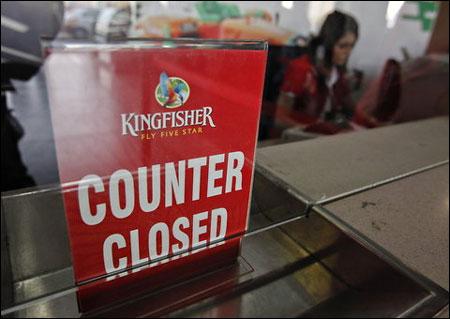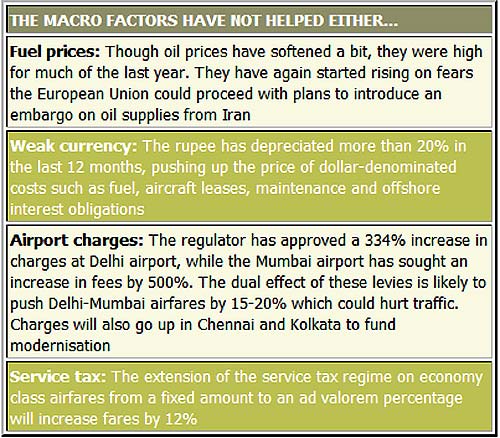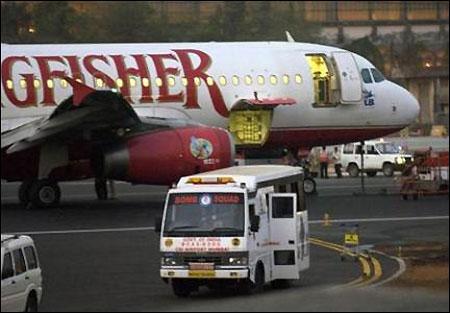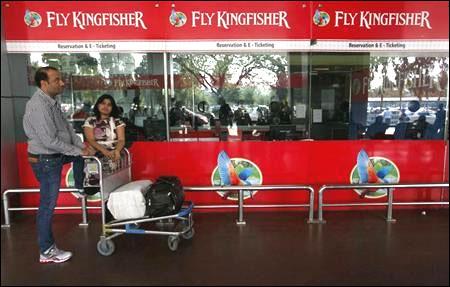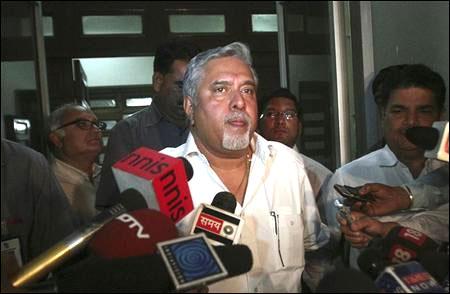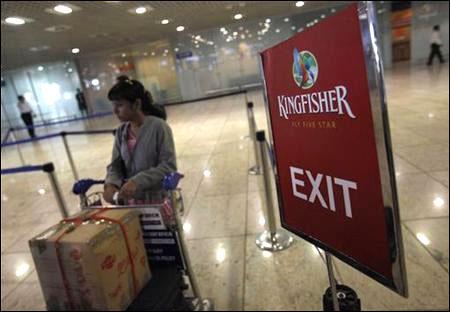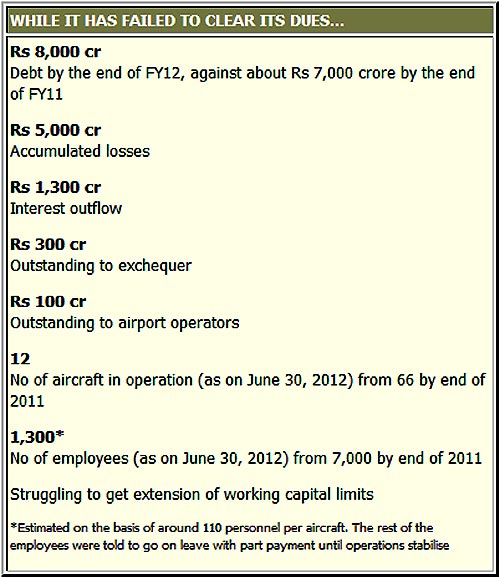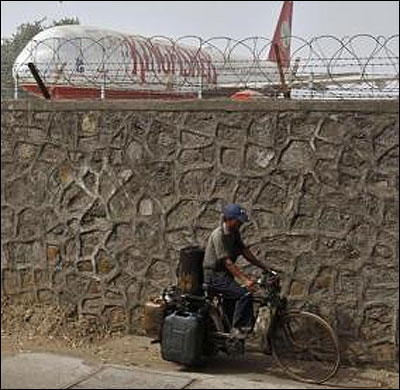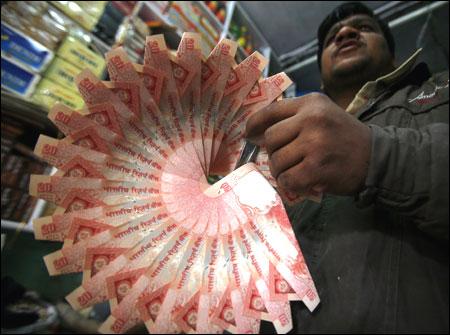 | « Back to article | Print this article |
Sinking story: Is Kingfisher hurtling towards a dead end?
Kingfisher Airlines Ltd, the cash-strapped carrier promoted by liquor baron Vijay Mallya, is set to enter tougher weather, with its financial woes mounting in a deteriorating macro economic scenario, leaving its lenders struggling to reduce their exposure to the carrier.
The airline owes nearly Rs 300 crore (Rs 3 billion) to the exchequer, and senior tax authorities have already attached its bank accounts for non-payment of dues.
Kingfisher also owes Rs 100 crore (Rs 1 billion) to airport developers - GMR and GVK Group. Besides, employees, who haven't got salaries for a few months now, have given an ultimatum to the management to pay them immediately.
Click NEXT to read more...
Sinking story: Is Kingfisher hurtling towards a dead end?
This is the present condition of the airline, which, until recently, was India's second biggest by market share.
The operational staff of Kingfisher is expected to be around 1,300 now for the 12 aircraft it is operating, down from a massive 7,000 employee base for 66 aircraft by the end of 2011.
The airline has said its "excess employees" will be on leave till their "holding plan" gets sorted out and until its discussion with lenders and tax authorities fructify and it regains the original fleet strength, which now appears a distant possibility.
Click NEXT to read more...
Sinking story: Is Kingfisher hurtling towards a dead end?
Kingfisher's share price has fallen to almost a fourth in the past 12 months. It closed at Rs 11.94 on Thursday on BSE.
Today, the company is struggling to manage a debt of around Rs 8,000 crore (Rs 80 billion), compounded by negative net worth and precipitated by accumulated losses of around Rs 5,000 crore (Rs 50 billion).
Most of the operational income is going towards oil marketing companies and airport developers in a bid to keep at least 12 aircraft flying, without which the airline will grind to a halt.
Click NEXT to read more...
Sinking story: Is Kingfisher hurtling towards a dead end?
Is Kingfisher hurtling towards a dead end?
"I don't think Kingfisher has reached that situation yet," said Kapil Kaul, CEO (South Asia) of Centre for Asia Pacific Aviation (Capa), a leading aviation consultancy firm.
"With around 12 aircraft, they can still manage to stabilise the operations if equity infusion happens from an overseas carrier. Until then, it certainly will be a struggle, but I don't think they will close down," he added.
However, this is not a unanimous view among analysts and sector experts. "Kingfisher Airlines doesn't have any other option but to shut down. From an average of 350 flights a day to around 90 flights now, it happened quite quickly. And from that, going down further is just a matter of time," an analyst with a well-know Indian brokerage firm told Business Standard.
Click NEXT to read more...
Sinking story: Is Kingfisher hurtling towards a dead end?
"It's more likely that the lenders will be going for the last step of encashing the guarantees which they hold," the analyst, who tracks the Indian aviation sector quite closely, said on condition of anonymity.
Added Jasdeep Walia, an aviation analyst with brokerage firm Kotak Securities Ltd: "In our view, Kingfisher could make further capacity reductions in the current quarter. Normally, the second quarter is the weakest for airlines, when PLF (passenger load factor) and hence yields are low and cash losses peak."
Further cash losses and lack of working capital support from banks can lead to more capacity cuts by Kingfisher, he said. "As of April 2012, Kingfisher accounted for approximately six per cent of industry capacity," added Walia.
Click NEXT to read more...
Sinking story: Is Kingfisher hurtling towards a dead end?
The extent to which Kingfisher has been cancelling flights recently could be gauged from this. On Wednesday, it cancelled a total of 17 movements from Bangalore, while on Monday it cancelled 18 flights.
Four flights were cancelled from Mumbai and three from Delhi, while important stations such as Hyderabad and Kolkata are not being served.
The airline has been, however, maintaining that there are some cancellations due to maintenance work and they are continuing with their holding plan until they get extended working capital limits from banks and the tax authorities defreeze their accounts.
Click NEXT to read more...
Sinking story: Is Kingfisher hurtling towards a dead end?
A consortium of lenders led by State Bank of India is struggling to see how best they can try to get their returns.
ICICI Bank Ltd has managed to get rid of the problem when it sold its Rs 430-crore (Rs 4.3 billion) debt exposure to a debt fund managed by Srei Infrastructure Finance Ltd. Other banks may not find such options coming in easily.
While the promoters have pledged as much as 90 per cent of their holding towards various lenders, which is now worth hardly around Rs 30 crore (Rs 300 million), bankers are mulling how best they can monetise the corporate guarantees that the UB Group has provided towards Kingfisher.
Click NEXT to read more...
Sinking story: Is Kingfisher hurtling towards a dead end?
UB Holdings Ltd (UBHL), the primary promoters' vehicle, has provided Kingfisher with corporate guarantees totalling Rs 9,135 crore (Rs 91.35 billion).
Each of these primary obligations is supported, in the first instance, by Kingfisher's assets and cash flows and the UBHL guarantees are by way of additional collateral. It is this pie of corporate guarantees that the bankers may have to tap to recover their dues.
UBHL holds stakes in other group companies of UB Group -- United Breweries Ltd, United Spirits Ltd and Mangalore Chemicals and Fertilizers Ltd--which have also been pledged towards the lenders.
Click NEXT to read more...
Sinking story: Is Kingfisher hurtling towards a dead end?
The bankers' first move may be to tap into these resources to press for further equity infusion from the promoters.
The airline has been sweating its equity as much as possible and a few steps such as encashing on its real estate holdings can just give them some breathing time until the foreign direct investment policy in the Indian aviation gets clearer.
The macro-situation for Kingfisher and for the Indian aviation sector in general is expected to deteriorate further.
Click NEXT to read more...
Sinking story: Is Kingfisher hurtling towards a dead end?
"The oil prices and the volatility in the rupee are expected to dent the prospects of the Indian aviation sector during this financial year. In addition, the airports regulator has already approved a 334 per cent increase in charges at the Delhi airport, with Mumbai expected to be allowed to raise fees by up to 500 per cent," said Capa's Kaul.
"Combing these additional levies is likely to have the impact of increasing Delhi-Mumbai airfares by 15-20 per cent, which will affect traffic. Increased airport charges are expected to be progressively introduced at other airports such as Chennai and Kolkata to fund the modernisation programmes," he added.
